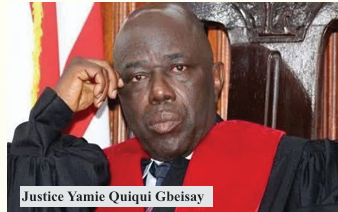Associate Justice-Designate Cllr. Boakai Kanneh Urges Total Rewrite of 1986 Constitution

Supreme Court Associate Justice-designate, Cllr. Boakai Kanneh, has issued a bold and unprecedented call for a total rewrite of Liberia’s 1986 Constitution, declaring it outdated and insufficient to meet the evolving legal and political needs of the country. Speaking during his confirmation hearing before the Liberian Senate’s Judiciary Committee, Cllr. Kanneh argued that while the 1986 Constitution has served as a foundational legal framework for post-conflict governance, it no longer reflects the realities of contemporary Liberia. “Our Constitution must reflect the realities of today’s Liberia,” Kanneh asserted. “We need a foundational legal document that is relevant, responsive, and robust enough to address current and future challenges.” He emphasized that his proposal for a complete constitutional overhaul is not intended to dismantle the existing structure of government, but rather to modernize and strengthen it. According to the nominee, key provisions require re-examination in order to enhance democratic accountability, ensure the protection of human rights, and promote effective governance. Kanneh’s recommendation was met with interest and curiosity by members of the Senate Judiciary Committee, several of whom praised his legal acumen, experience, and commitment to national development. Lawmakers acknowledged that his forward-thinking views could stimulate important national conversations on constitutional reform. With decades of legal service and a strong track record of public service, Cllr. Kanneh is widely regarded as a highly competent nominee. If confirmed, he is expected to bring a reform-minded perspective to the Supreme Court Bench one that could influence critical legal interpretations at a time when Liberia faces pressing debates on governance, rule of law, and institutional integrity. Kanneh’s statement has sparked national dialogue on whether a constitutional rewrite rather than a series of amendments is necessary to usher in a new era of legal modernization and participatory governance. His nomination comes at a pivotal moment in Liberia’s democratic journey, with increasing calls from civil society, political actors, and international partners for institutional reforms and improved constitutional clarity. The Senate is expected to make a final determination on his confirmation in the coming days.


